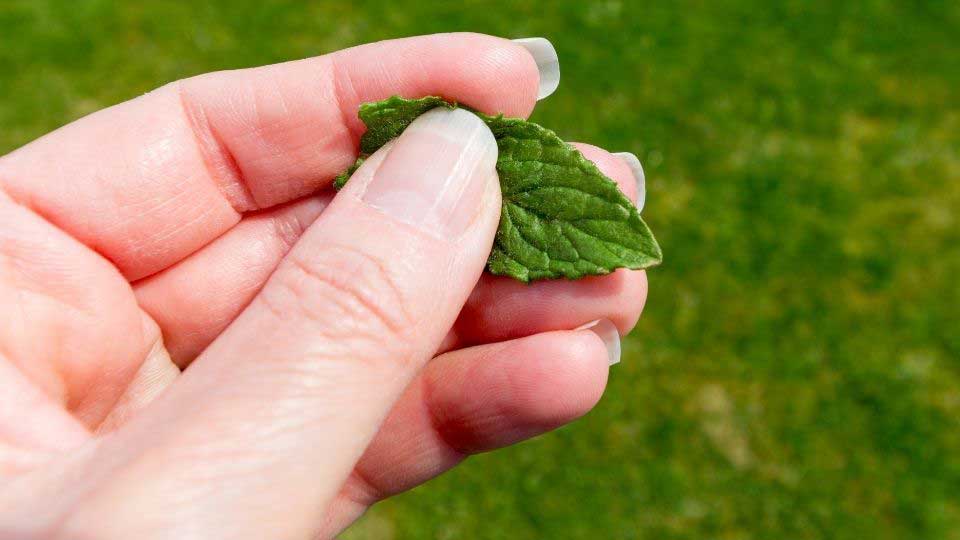
10 Romanian idioms to celebrate the Day of Multilingual Blogging 2014

Happy Day of Multilingual Blogging!

I had initially thought of writing this post in Romanian, but realised the audience would be slightly more limited :). But, as Romanian is my mother tongue, and is not as popular as others, but a very rich and beautiful language, I thought it would be nice to present some idioms and expressions that are extremely creative and vivid.
Try to guess the meaning of the idioms before you read the explanation. How many did you get right?
1
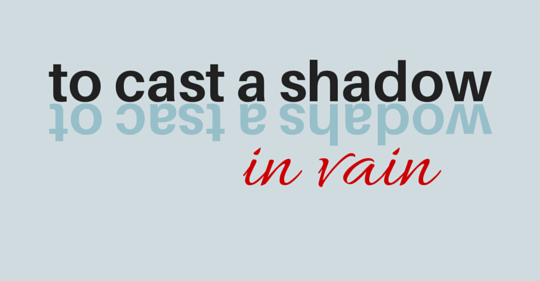
- Romanian: a face umbră pământului degeaba
- Literal English translation: to cast a shadow in vain
- Meaning: said about a useless, worthless, good-for-nothing person, who will never accomplish anything in their life; a ne’er-do-well
2

- Romanian: a bate șaua să priceapă iapa
- Literal English translation: to beat the saddle so the mare gets the point
- Meaning: to drop a hint
3

- Romanian: a freca menta
- Literal English translation: to rub mint
- Meaning: to waste time, to do nothing
By the way, there is actually a website dedicated to ‘mint rubbing‘ – have a look, it explains this concept in details and it is a source of fun.
4

- Romanian: a călca pe bec
- Literal English translation: to step on a light bulb
- Meaning: to fall pregnant (especially as an unmarried woman, in times when this was considered shameful); more recently, also used in the sense of ‘to get into trouble’
5
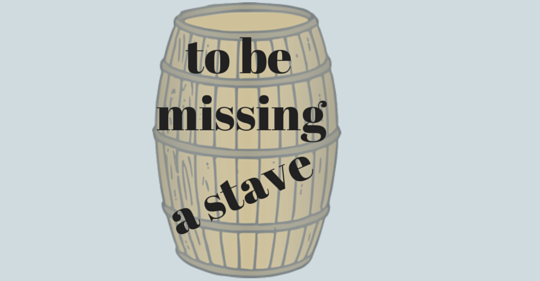
- Romanian: a-i lipsi o doagă
- Literal English translation: to be missing a stave
- Meaning: to be crazy; to lose one’s marbles
6

- Romanian: a tăia frunză la câini
- Literal English translation: to cut leaves for the dogs
- Meaning: to be lazy; to waste time
7

- Romanian: a se uita ca vițelul la poarta nouă
- Literal English translation: to stare like a calf at a new gate
- Meaning: to be confused
8

- Romanian: a o căuta cu lumânarea
- Literal English translation: to look for something with a lit candle
- Meaning: to look for trouble
9
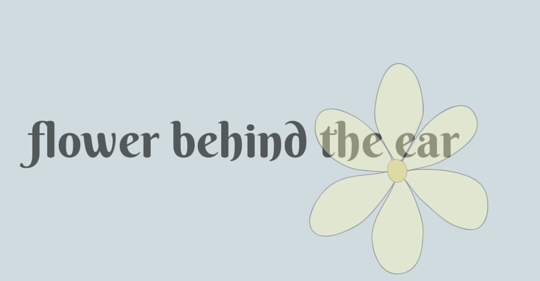
- Romanian: floare la ureche
- Literal English translation: flower behind the ear
- Meaning: very easy; a piece of cake
10
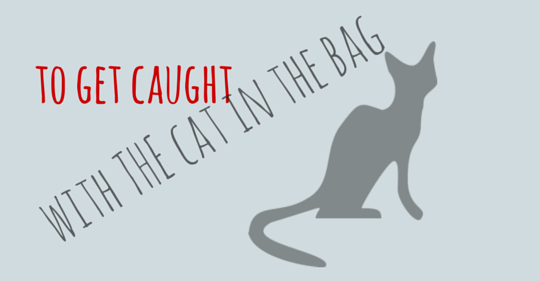
- Romanian: a fi prins cu mâța-n sac
- Literal English translation: to get caught with the cat in the bag
- Meaning: to be caught red-handed
BONUS: I have recently heard of this French idiom and I simply LOVE it! And since French is also a Romance language like Romanian, with so many things in common, I had to share it.
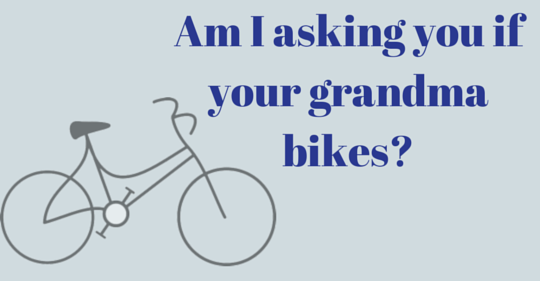
- French: Est-ce que je te demande si ta grand-mère fait du vélo?
- Literal English translation: Am I asking you if your grandma bikes?
- Meaning: Mind your own business!
I really hope you enjoyed the beauty and richness of my mother tongue. If so, I’d love to hear which is your favourite of the above idioms in a comment below. And don’t forget to add one in your language!



35 Comments
very nice! cast a shadow in vain was my favourite 🙂 smooth translation…
I also like the illustrations very much
and my 2 cents from french: “il faut pas pisser partout”wich stands for “stop bitching arround”
Thank you 🙂 I had a lot of fun with these, as you can imagine. The illustrations have been done in Canva, I’m glad you like them. Coming from someone who does what you do means a lot.
Thanks for the addition of the French expression, very interesting.
I love the expression of rubbing mint. Anyone who grows mint knows the feeling of idly rubbing the leaves to enjoy the smell.
German and English both have the concept of a “mooncalf.” It has dark origins and used to refer to misshapen calves thought to be deformed due to the sinister influence of the moon. Nowadays, it is often used to refer to people who seem confused or dazed by something. In German, you would say “wie ein Mondkalb glotzen” to stare like a mooncalf.
See you next year for the DMB!
Apparently the ‘mint rubbing’ has a different origin: a long time ago, when servants were sent to do various chores, there were some who would always choose to rub the wooden tables with mint (to eliminate odours and make them smell nice) rather than go chop wood or such other jobs. Therefore, they were seen by others as lazy and wasting time, preferring to “rub mint”.
“To stare like a mooncalf” – interesting. I think I should write another post explaining the origin of these idioms.
Yep, I’d choose rubbing tables with mint leaves over chopping wood any day!
And a post on the origin of idioms would be great. It’s simply a fascinating topic.
I would too, of course 🙂 And indeed, idioms and their origins are fascinating.
“A face umbră pământului degeaba” is literally “To cast a shadow *on Earth* for nothing”. It comes from the traditional folklore concept that everything rising above the surface of the Earth (and thus casting a shadow) is there for a purpose, if only to be a resting place for a traveller. To cast a shadow without any purpose is, therefore, to be the most useless thing on Earth.
“A bate șaua să priceapă iapa” is actually a lot more than just to *drop* a hint. It’s a concerted effort at pushing a person into doing something without actually mentioning it in the open.
I know “A călca pe bec” to only have the meaning of doing or saying something in public that was embarrasing *to the others* present and only realizinng it moments later when there’s nothing left to do anymore. Also, the proper translation in English should use the definite article to match the Romanian meaning of the phrase: “to step on *the* light bulb” (the light bulb being the issue that was supposed to be hidden/contained and is now in the open).
I’ve only seen the “a avea o doagă lipsă” version in common use, which would be much better translated literally as “to have one stave missing”. Also, the Romanian meaning is “to *be* crazy” as opposed to “become” or “go” crazy — so IMHO “to lose one’s marbles” doesn’t apply.
“A freca menta” and “A tăia frunză la câini” are almost synonyms, with the difference being the acceptance of the facts by the accused: in the first case, the person is openly doing nothing useful; while in the second, they are performing some action that’s supposed to pass for “real work” when in fact they’re just slacking it off.
“A se uita ca vițelul la poarta nouă” comes from the long known rural habit of allowing cattle to “walk themselves back home”. The herder will usually bring the cattle back only to the first village roads and then leave them to their own. Adult cows know where their house is and so will happily walk back there and in some cases even nudge the gate open and go inside. This place memory, legend has it, will survive “changing the gate” (or re-painting it, your get the idea) and so an adult cow will find her way home even in the face of superficial changes. A young calf, on the other hand, will remember the path home but will be surprised by a changed appeareance and thus remain there “staring” without daring to enter.
I once more have to propose adjusting the English translation, this time for “a o căuta cu lumânarea”. The Romanian meaning differs slightly from the word-for-word rendition and thus the literal English translation should be “to look for trouble with candlelight”. As for usage, it’s meant as a warning to a person (more knowingly than not) apparently trying to get themselves into trouble.
Once again, like above for the light bulb, “a fi prins cu mâța-n sac” is literally “to be caught with *the* cat in the bag”, the cat being the object or the action that you’re trying to hide having stolen or done. It’s possible the English saying “to let the cat out of the bag” is very closely related to this one.
Hi Radu,
Many thanks for stopping by and for your additions, especially to the etymology of some of the idioms presented. However, please allow me to disagree with some of the points you raised and explain why:
• ‘for nothing’ and ‘in vain’ mean exactly the same thing, i.e. ‘without purpose’ and I think I did explain that it refers to a useless person
• According to the DEX (for non-Romanian English speakers that’s the equivalent of Longman or Cambridge dictionaries), ‘a bate șaua să priceapă iapa’ means “a da să se înțeleagă ceva în mod indirect, a face aluzie la ceva”, which the English ‘to drop a hint’ reflects perfectly (“something that you say or do to suggest something to someone, without telling them directly”)
• I do not agree with the explanation you gave for ‘a călca pe bec’ – as I said, it was initially used in the sense of ‘to get pregnant’ – if an unmarried woman got pregnant, it was frowned upon, so she was in trouble, in a difficult situation, therefore today’s use. You mention “the light bulb being the issue that was supposed to be hidden/contained and is now in the open” – this would be the English ‘to let the cat out of the bag’.
• The DEX does not mention ‘a avea o doagă lipsă’, but ‘a-i lipsi o doagă’, but that’s not the point; they both mean the same; I still think ‘to be missing a stave’ sounds more natural in English than ‘to have one stave missing’, but it’s a matter of stylistic choice in the end; I added ‘to lose one’s marbles’ as the closest equivalent idiom and because I really like it, it’s visual, but I did mention the Romanian one means ‘to BE crazy’, didn’t I?
• I agree. Both ‘a freca menta’ and ‘a tăia frunză la câini’ are very similar. I chose to include them both because they are equally funny
• That’s what I knew about the etymology of ‘a se uita ca vițelul la poarta nouă’ too; my plan (as stated in a comment above) was to discuss the etymology of some of these idioms in a future post, but that’s a great addition, thank you.
• I think you misunderstood my purpose – I tried to provide a very literal (word-for-word) translation so non-Romanian speakers get a more visual idea and try to guess the meaning; of course that’s not what I’d do were I to translate these for a project 🙂 ; if I had said ‘to look for trouble…’, I would have given away the meaning, which is, of course, ‘to look for trouble’, as included as an explanation under the picture.
• ‘to let the cat out of the bag’ is not the English equivalent of the Romanian expression; the Romanian ‘a fi prins cu mâța-n sac’ is ‘to be caught trying to steal or cheat’, which is closer to ‘to be caught red-handed’ (to be caught doing something wrong), while the English ‘to let the cat out of the bag’ is ‘to tell someone a secret, especially without intending to’, so no connection whatsoever (apart from the cat and the bag that is 🙂 ); however, you are right about ‘the cat’ instead of ‘a cat’ – I had corrected this but forgot to replace the picture – done!
Felicitările mele, ai făcut o alegere excelentă scriind articolul în engleză, iar subiectul tratat îmi ”unge sufletul”! Thank you for sharing a bit of the Romanian wisdom with our foreigner colleagues! Congrats!
Mulțumesc, Andreea! Which of the above idioms is your favourite one?
Cu plăcere Alina. I like all the idioms you have chosen, but my favorite one and maybe the one that I use most is ‘to cast a shadow in vain’.
Intriguing! I had no idea Romanian was your mother tongue! 🙂
Yup! 🙂 Which of the idioms did you like the most? I really want an example of a Greek one as well.
It has to be floare la ureche and that’s because it sounds relatively Italian! I will email you something in Greek as soon as I can. 🙂
Well, not surprising, since Italian and Romanian are both Romance languages and have both derived from Latin. 🙂
Romanian expression: To steel your own hat… ???
Oh, yes, stealing one’s own hat/cap is a great one, isn’t it? 🙂 Where did you hear it?
While I couldn’t find the origin of this expression, it means to harm oneself (not necessarily physically) thinking there will be some advantages to be had. As far as I can tell, the closest English equivalent (albeit according to the Urban Dictionary) is ‘to cook one’s own goose’.
Thanks for stopping by and commenting. I’d love to know about how you came across this expression.
I’m wanting to add many more Romanian proverbs to my site. Would you help me translate those that I’ve found in Paczolay’s “European proverbs in 55 languages”?
And where do you live?
Hi Anthony, I’ll have a look at your site and get back to you.
I come from Romania, but I’ve been living in the UK for several years. May I ask why this is important?
Cum s-ar traduce “oare ai luat teapa”?
Sunt multe moduri de a spune ‘a lua țeapă’: to be cheated/ double-crossed/ misled/ scammed/ screwed/ swindled (dacă este vorba de bani)/ ripped-off etc. Bineînțeles, depinde de context 🙂
O imagine în genul celor din postare ar fi interesantă.
What about ,, nu plange la mormant strain” ? What would the English translation be?
Hi Diana! Thanks for stopping by. I am afraid this is the first time I hear about this Romanian saying. Can you provide more details about it (etymology, where and how it’s used, meaning, some sources if possible)?
Hi Alina
I really know nothing about the etymology , what I know is that it is used in Transilvanya and the meaning is” n-avea tu grija altora” , “mind your own business” or something along those lines. I ‘ve done some research but found nothing?
These are beautiful illustrations of idioms every Romanian uses on a daily basis, and somehow we don’t quite see how funny they are until we translate them. Keep up the great work! And check out another page of illustrated idioms: fb.com/tedoaremintea for more fun with language.
Thank you! You are right, we sort of take them for granted, don’t we? But a literal translation will reveal their funny side and sometimes a bit more. Your Facebook page provides some interesting ones too, thanks for sharing.
More of an idea: There’s currently no website to translate idioms from Romanian to English (U.S.) and the other way around (U.S. -Romanian).
Looks like you’d have the leverage to make one and I can bet you’d make some bucks too.
For instance, does this have an U.S. sibling: “c-o fi, c-o pati”?
Hi Alina,
I was born in Romania, and it’s my first language, but there are some recent esxpressions I’m not familiar with. I recently came across “Ptr Putin” and I think it means “pentru putin” (it was nothing) but maybe there’s another meaning (about Putin, the Russian leader) that I’m missing. Any guidance?
Thanks!
Alexandra
Hi Alexa,
While not an idiom, the phrase you mention (a shortened form for ‘pentru puțin’) is used as a reply to ‘Thank you’ and it means ‘You’re welcome’. The closest in meaning in English would probably be ‘Don’t mention it’. I doubt it has anything to do with Russia’s leader. But, as usual, context is everything, so if you can tell me more about where you came across this and what preceded and followed it, I can confirm. 🙂
It can’t mean anything else other than “pentru puțin” – literally “for little” – as in “don’t mention it/no problem”. It’s just “puțin” is incorrectly typed with a capital and moreover, the abbreviation for “pentru” is “pt.” and not “ptr.” at all.
Hello Alina, I enjoyed your article on idioms in Romanian. I am in Moldova for Christmas and I’m practicing my Romanian and Russian language skills although I am an American from California. Romanian is a wonderful language, it is like music! I enjoy learning from the people that I meet and speaking what little I do know. I think I will take up a more formal study of Romanian when I get back to the United States. I would like to learn more from your experiences as a Romanian speaker and translator. Thank you very much, I hope that we have a chance to discuss further!
Hi Tim! Thanks for the lovely words and I’m glad you enjoyed this post. Idioms are the spice of a language, aren’t they? And I may be biased, but I think Romanian has some really good ones!
What prompted you to take up Romanian? Anything in particular you struggle with? Do let me know what sort of tips/advice you’d like to read or discuss with me and I’d be happy to help if I can.
Hi Alina,
My mother’s mother tongue was Romanian. She was a doting mother who frequently used expressions of adoring love, like:
– oyke may din cap (eyes of my head?)
– soufle tow meauh (my breathe?)
One expression I never understood sounded like, sa mere zum far deer.
Another sounded like, me tow pesc.
If you recognize these expressions, please translate them for me.
Thanks
Hi Pierro,
Thanks for your comment and I hope you enjoyed reading these idioms. By the way, would someone like you find it more interesting/useful if pronunciation were included as well?
Your words about your mother’s love really touched me and I am happy to help decipher those expressions:
– ‘ochii mei din cap’ is the equivalent of ‘the apple of my eye’, so definitely an expression of profound love. The idiom is in fact ‘a iubi pe cineva ca pe ochii din cap’ (literally to love someone as much as one loves their own eyes)
– ‘sufletul meu’ means ‘my soul’ – another way to say you love someone from the bottom of your heart
– I can’t figure out the third one, but I will keep investigating 😊 Or maybe someone else can jump in and help
– ‘mă topesc’ means ‘I’m melting’, used in the same way you can use it in English
Hope this helps.
Thank you Alina. I know that pronunciation guides would help me, but could add confusion for others, so take a poll before you take on the extra work.
All the best